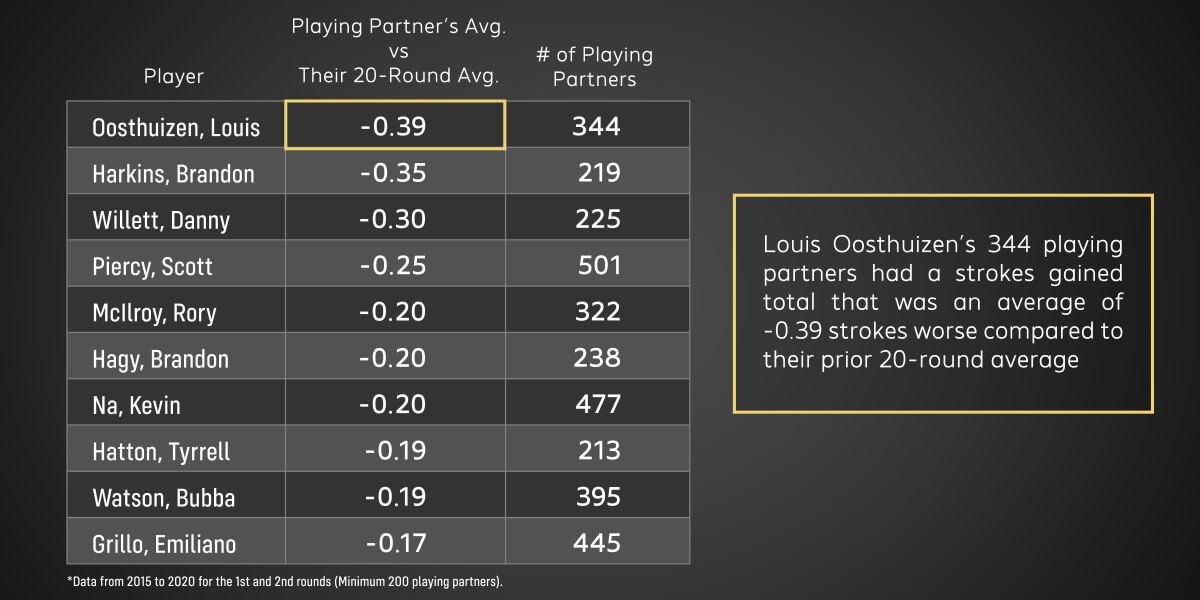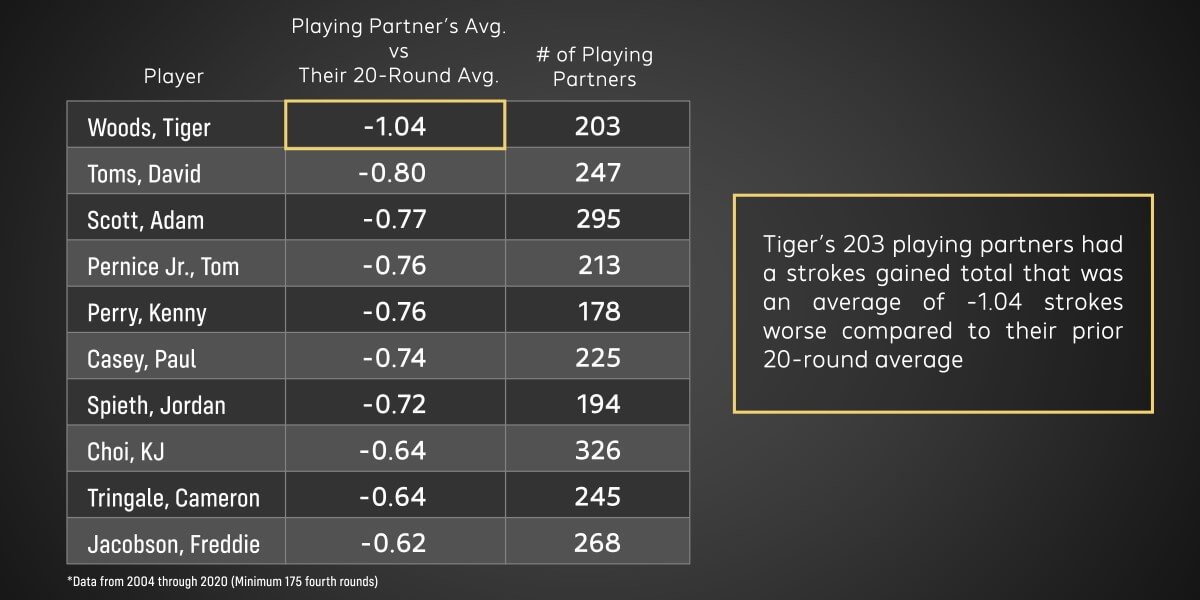For many of us, there are one or two guys we’d rather not play with. For whatever reason, we just seem to play worse when paired with them. Someone I used to play with was a great guy but EVERY time we played together, I scuzzed it all over the course. Would it surprise you to learn that tour players deal with the same issue?
Last week, Bubba Watson was asked if it mattered with whom he played for the first two rounds.
“It matters tremendously. There’s guys that are a shot, maybe a two-shot, penalty when you see their name on that sheet. Maybe that’s what they say about me, too, so I guess it works both ways.” – Bubba Watson
I was curious if this could be quantified. Are there some players whose presence in a group causes others to play worse? Are there some that have the opposite effect and bring out the best in their playing partners?
Was it as challenging to play with Tiger in the fourth round as the commentators would have us believe?
Doing the Math
To find the answers, I compared a player’s strokes-gained total for each round with their prior 20-round average.
A Brief Overview of Strokes Gained Total
For each round, a player's score is compared to the average score that day. For example, a player shoots 70 on a day when 71.2 was the average score for the entire field. That player would have a strokes gained total of +1.2 (71.2 – 70 = +1.2). Another player shoots 72 on that same day. That player would have a strokes gained total of -0.8 (71.2 – 72 = -0.8).
For every round played, I calculated the average strokes-gained total for a player’s prior 20 rounds. That average was then compared to the strokes gained total in their “current round.”
Let’s say a player’s 20-round average was +1.45. In their next round, they are paired with Tiger and gain +0.20 strokes. We compare strokes-gained total from that round (+0.20) to the average of the prior 20 (+1.45).
0.20 – 1.45 = -1.25
In the most recent round with Tiger, the player performed -1.25 strokes worse than their prior 20-round average. Sticking with Tiger as our target player, we do this same calculation for all his playing partners for all his rounds. We then average those strokes-gained differences.
It’s a reasonable assumption that a multitude of factors influences who plays better or worse with a particular player. I cannot imagine trying to play against the backdrop of the galleries that follow Tiger.
I spoke with former PGA TOUR player and two-time winner Rick Fehr. He deserves the credit for coming up with a catchy name for this statistical category: “Strokes-Gained Playing Partner.”
And now the results!
First and Second Rounds Only
Playing Partners Play Worse
These are the top 10 players whose playing partners play worse than they normally do. This is from 2015 to 2020 for the first and second rounds (Minimum 200 playing partners).
Playing Partners Play Better
These are the top 10 players whose playing partners play better than they normally do. This is from 2015 to 2020 for the first and second rounds (Minimum 200 playing partners).
All Rounds
Playing Partners Play Worse
These are the top 10 players whose playing partners play worse than they normally do. This is from 2015 to 2020 for ALL rounds (Minimum 300 playing partners).
Playing Partners Play Better
These are the top 10 players whose playing partners play better than they normally do. This is from 2015 to 2020 for ALL rounds (Minimum 300 playing partners).
Fourth Round Only
This last look is at players in the fourth round only. The data is from 2004 through 2020 (Minimum 175 fourth rounds). It appears playing with Tiger in the fourth round was a difficult thing to do!
The commentators are right. Being paired with Tiger on a Sunday is effectively a one-stroke penalty.
Submit Your Ideas
Got an idea for a story driven by tour data? Let us know in the comment section below.




















Maj Mike
4 years ago
Excellent charts and I noted several slow players showed up on strokes lost. Slow play is the bane of both the pros and us hackers. Your ability to stay focused is directly correlated to the time span of having to maintain your focus. Slow play impacts your tempo. The golf course loose revenue through disgruntled players not returning. The worst part is that the golf’s ruling bodies and courses just keep giving lip service in the USA. Time clocks should be on the first and 10th tee. If your group is over 1hr 45 minutes then you must skip the 10th. Your group would then be on probation and if they do it on the back nine then they could not book tee times before noon. Lately, I have been booking earliest tee times and our group gets around in less than 3 hours.